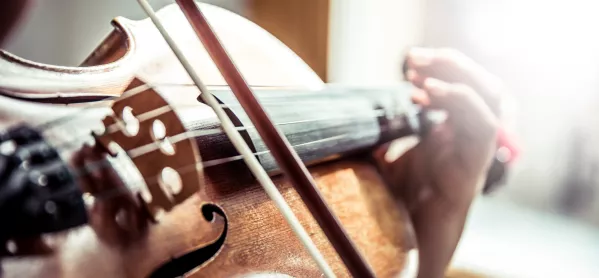Music tuition ‘rapidly’ becoming unaffordable for many

Scotland’s schools are “rapidly moving” to a position where only students from wealthier families can afford music lessons, a teaching union has said.
The EIS spoke out about the “unjust and unacceptable” situation, highlighting that 27 of the country’s councils have some form of charging regime in place for instrumental music tuition.
This can require parents to pay fees for music lessons, instrument hire charges or a combination of both, leaving only five local authority areas where music lessons are free.
Music tuition: Number of music pupils drops for third year in a row
Background: Covid impact on music teaching revealed by survey
Opinion: ‘Music will be pivotal in the recovery from Covid-19’
Music: High levels of engagement in lockdown music teaching
Quick read: ‘Delusional’ advice to learn new instrument is attacked
The union has published a new briefing paper highlighting the stark challenges facing instrumental music provision in Scotland’s schools during the Covid-19 pandemic, based on a recent survey of its instrumental music teachers (IMTs) across Scotland.
The union said a rise in charges was “even more worrying”, highlighting that in some parts of Scotland the annual cost of school music lessons can top £300, with charges reaching £524 for one year in one local authority.
In areas where no charges are imposed, the number of pupils studying music has increased by almost a third (31.4 per cent) since 2012-13, it said.
But the EIS stressed that in authorities with charges there has been a 12.7 per cent fall in the number of music students over the same period.
EIS general secretary Larry Flanagan said: “Scotland is rapidly moving towards a scenario where only children from well-off families can learn to play an instrument. This is unjust and unacceptable.
“We must reverse the trend of charging, to allow free access to music education for all, particularly those for whom the poverty-related attainment gap has widened as a result of Covid-19.”
He spoke out as the EIS raised concerns about the “damaging impact” of the coronavirus pandemic on music tuition in schools - particularly for those currently studying the subject for SQA qualifications and for those from disadvantaged backgrounds.
The EIS said there have been “inconsistent approaches” in music lessons, saying specialist instructors have been unable to return to school safely in some areas, and are having to adapt their teaching for online classes.
The union has particular concerns about tuition in voice, wind and brass, saying instructors in these areas “anxiously wait to hear whether they can safely return to face-to-face teaching in schools”.
The EIS said that Covid-19 risk assessments need to take account of the requirements for music teaching, including the need for adequate space and well-ventilated rooms.
It also fears that a reduction in teaching caused by the pandemic could lead to fewer students studying music - with this potentially putting specialist music teacher posts in jeopardy.
The union said it will “continue to defend the provision of instrumental music tuition for the benefit of children and young people and for society as a whole”.
A Scottish government spokesperson said: “Music education is of enormous benefit to young people and we are committed to working collaboratively to find solutions to help ensure instrumental music remains accessible to all.
“Local authorities are responsible for ensuring all children and young people have access to the full curriculum, including the expressive arts, and councils should consider the benefits that learning a musical instrument can have on wellbeing and on attainment.
“We know that Covid-19 has brought additional challenges for music tuition in schools.”
The spokesperson added: “Education Scotland has worked with teachers across the country to collect and share emerging practical examples of how teachers are managing music learning under Covid-19.
“Creative ideas include the use of music technology apps on smartphones, running online masterclasses with professional musicians, and using technological solutions to facilitate rich and rewarding physically distanced lessons.
“The experience of lockdown shows that access to technology and digital capability is, and will remain, a fundamental aspect of education in Scotland. That is why we are investing £25 million to address digital exclusion in schools.”
*Tes Scotland magazine will publish a detailed feature on the impact of Covid-19 on music in its 22 January issue
You need a Tes subscription to read this article
Subscribe now to read this article and get other subscriber-only content:
- Unlimited access to all Tes magazine content
- Exclusive subscriber-only stories
- Award-winning email newsletters
Already a subscriber? Log in
You need a subscription to read this article
Subscribe now to read this article and get other subscriber-only content, including:
- Unlimited access to all Tes magazine content
- Exclusive subscriber-only stories
- Award-winning email newsletters